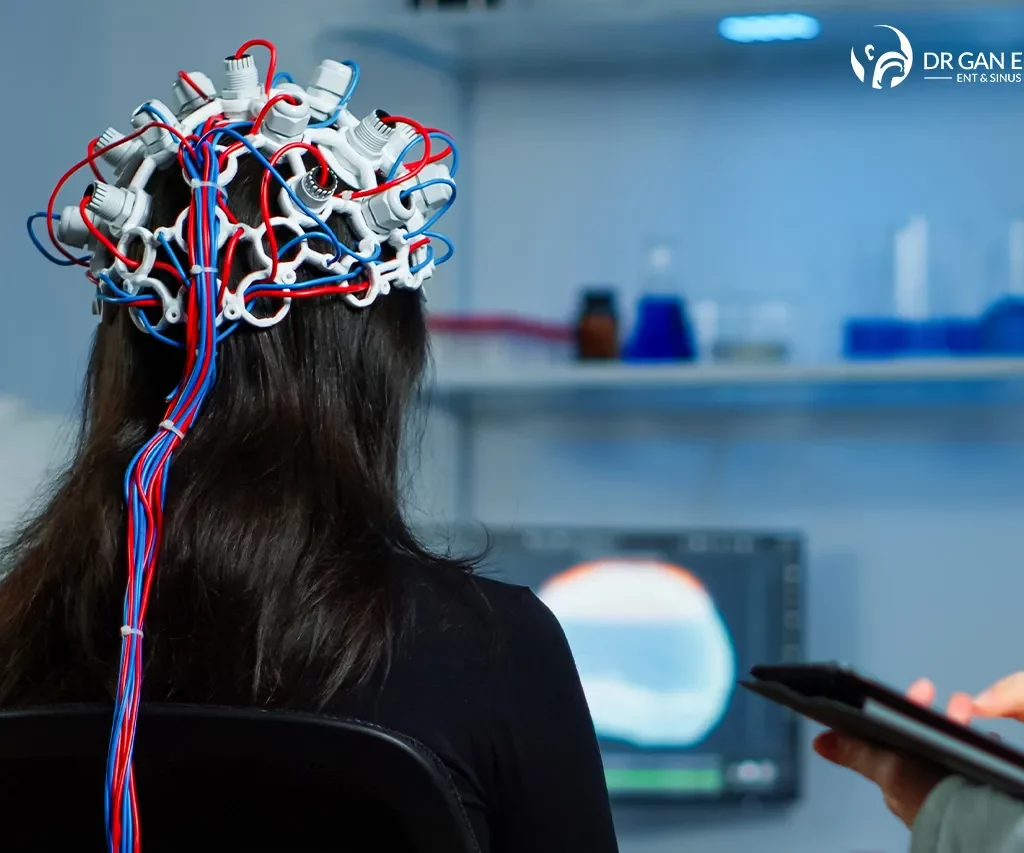Sleep studies are important tools used to diagnose and understand different sleep disorders that affect people living in cities like Sydney, Adelaide, and Canberra. These thorough assessments track important body functions during sleep, giving healthcare professionals the information they need to make precise diagnoses.
In Sydney, there are two main types of sleep studies:
- Home-Based Testing: A portable monitoring device allows patients to undergo sleep assessment in the comfort of their own beds.
- Clinic-Based Testing: Conducted in specialised sleep laboratories under the supervision of trained professionals.

Both methods measure key indicators such as:
- Breathing patterns
- Heart rate
- Blood oxygen levels
- Brain activity
- Body movements
Knowing the specific requirements and procedures for each testing method helps patients get ready for their sleep study. The decision between home and clinic testing depends on various factors, including the complexity of the suspected sleep disorder and the individual circumstances of the patient.
A well-conducted sleep study can find problems like sleep apnoea, insomnia, and other issues related to breathing during sleep. This leads to effective treatment plans and a better quality of life. If you live in Adelaide or Canberra, you can also access similar comprehensive sleep study services.
Air Liquide Healthcare – Your Trusted Partner for Sleep Apnea Studies
Air Liquide Healthcare is Australia’s largest provider of home sleep apnea studies and therapy solutions. With its wide range of sleep brands including SNORE Australia, Healthy Sleep Solutions, Mycroft, Complete Care, and Sleep Disorder Australia (SDCA), the organisation offers comprehensive sleep health services throughout the country.
Clinic-based sleep study Sydney provide comprehensive diagnostic testing through an overnight stay at a specialised sleep centre. These studies, known as polysomnography, capture detailed data about sleep patterns, breathing, and body movements.
The Patient Journey at Air Liquide Healthcare
At Air Liquide Healthcare, we provide a complete solution for managing sleep apnea:
- Initial Assessment: Non-invasive recording through home-based sleep studies
- Diagnosis Validation: Results reviewed by qualified Sleep Physicians
- Treatment Implementation: Customised CPAP therapy initiation and titration programs
- Ongoing Support: Regular check-ups and therapy guidance
Collaborating with Leading CPAP Manufacturers
Air Liquide Healthcare collaborates with top CPAP equipment manufacturers to ensure patients have access to high-quality devices that meet their individual requirements. This integrated approach combines advanced technology with expert medical supervision to achieve the best treatment results.
Our Range of Sleep Solutions
We offer a variety of services to address sleep apnea:
- Advanced diagnostic equipment for accurate sleep pattern analysis
- Latest CPAP devices from trusted manufacturers
- Professional therapy guidance and support services
- Comprehensive follow-up care programs
By providing these specialised services, Air Liquide Healthcare remains a leader in diagnosing and treating sleep apnea in Australia, helping patients achieve better sleep health outcomes.

Understanding Clinic-Based Sleep Studies in Sydney
The Sleep Study Process
Patients arrive at the sleep clinic in the evening, typically between 7:00 PM and 8:30 PM. A private bedroom equipped with monitoring devices awaits each patient. The environment mimics a hotel room to ensure comfort during the overnight stay.
Learn more on: Melbourne Sleep Apnea Testing Do You Qualify for a Bulk-Billed Sleep Study
Sensor Attachment and Monitoring
Sleep technicians attach several sensors to monitor vital physiological parameters:
- Brain activity – EEG electrodes on the scalp
- Eye movements – Small sensors near the eyes
- Muscle activity – Sensors on the chin and legs
- Heart rhythm – ECG leads on the chest
- Breathing patterns – Bands around the chest and abdomen
- Blood oxygen levels – Small clip on finger
- Snoring sounds – Microphone near the throat
Booking Requirements
A GP referral is essential to schedule a clinic-based sleep study. The referral should detail:
- Sleep-related symptoms
- Medical history
- Current medications
- Previous sleep assessments
Sleep clinics are located throughout Sydney, including major hospitals and private facilities. Medicare covers bulk-billed sleep studies for eligible patients who meet specific criteria under the Medicare Benefits Schedule.
The comprehensive data collected during clinic-based studies helps sleep specialists identify various sleep disorders, from sleep apnoea to periodic limb movement disorder. This detailed assessment forms the foundation for creating targeted treatment plans.
The Convenience of Home-Based Sleep Studies in Sydney
Home-based sleep studies offer patients a non-invasive diagnostic option in their familiar environment. This alternative to clinic-based testing allows individuals to maintain their regular sleep routines while collecting vital sleep data. Learn more about diagnostic on https://www.health.harvard.edu/diagnostic-tests-and-medical-procedures
How Home Sleep Studies Work
The testing process involves a compact monitoring device that patients can set up independently. This portable equipment measures essential sleep parameters:
- Blood oxygen saturation levels
- Heart rate and breathing patterns
- Body position and movement
- Airflow through the nose
- Chest and abdominal movement
Advantages of Home Sleep Studies
The simplicity of home testing stands out as a significant advantage. Patients receive the monitoring device with clear instructions for proper placement of sensors. The equipment automatically records data throughout the night, requiring minimal technical knowledge from users.
Who Can Benefit from Home Sleep Studies?
Home sleep studies prove particularly beneficial for:
- People with mobility challenges
- Those living in remote areas
- Individuals with family commitments
- Patients who experience anxiety in clinical settings
- Shift workers who sleep during unconventional hours
What Do Home Sleep Studies Aim to Detect?
The primary focus remains on detecting sleep apnoea symptoms, including:
- Breathing interruptions during sleep
- Drops in oxygen levels
- Frequency of respiratory events
Support from Air Liquide Healthcare
Air Liquide Healthcare provides comprehensive support throughout the home testing process. Their sleep specialists ensure proper device setup and offer guidance via phone support when needed. The collected data undergoes professional analysis to determine the presence and severity of sleep disorders.
This convenient testing method maintains high diagnostic accuracy while prioritising patient comfort. The familiar setting often results in more representative sleep patterns, contributing to reliable diagnostic outcomes. To learn more about accuracy click here.
Medicare Coverage and Private Health Insurers’ Role in Sleep Disorder Treatment
Medicare provides substantial support for Australians requiring sleep studies through the Medicare Benefits Schedule (MBS). Under specific MBS guidelines, patients can access:
- Clinic-based studies: Full coverage when referred by a qualified medical practitioner
- Home-based studies: Rebates available for approved diagnostic services
- Follow-up consultations: Medicare benefits for specialist appointments
The Medicare rebate typically covers:
- Initial sleep study assessment
- Diagnostic testing procedures
- Result interpretation and reporting
- Required follow-up consultations
Private health insurance adds another layer of financial support for sleep disorder treatment. Many insurers include CPAP therapy coverage in their policies, offering:
- Partial or full coverage of CPAP equipment
- Rental options for CPAP machines
- Regular maintenance and replacement parts
- Access to sleep therapy specialists
The level of coverage varies between health funds and policy types. Patients should contact their private health insurer to understand:
- Specific waiting periods
- Annual claim limits
- Equipment replacement schedules
- Pre-approval requirements
Medicare and private health insurance often work together to create comprehensive coverage for sleep disorder diagnosis and treatment, making essential sleep health services accessible to Australian patients.
Exploring Actigraphy Testing as an Alternative Approach for Sleep Disorder Assessment
Actigraphy testing presents a non-invasive method for evaluating sleep patterns through continuous monitoring of physical activity. This innovative approach utilises a small, watch-like device worn on the wrist to track movement patterns during both wake and sleep periods.
How Actigraphy Works
The actigraphy device contains sophisticated sensors that:
- Record minute-by-minute activity levels
- Measure light exposure
- Track sleep-wake cycles
- Document sleep disruptions
Advantages of Actigraphy Over Traditional Sleep Studies
Unlike traditional sleep studies, actigraphy testing can gather data across multiple days or weeks, providing insights into:
- Sleep onset and wake times
- Total sleep duration
- Sleep efficiency
- Night-time awakenings
- Day-to-day sleep pattern variations
Sleep Disorders Diagnosed with Actigraphy
This testing method proves particularly valuable for diagnosing specific sleep disorders, including:
- Circadian rhythm disorders
- Chronic insomnia
- Delayed sleep phase syndrome
- Advanced sleep phase syndrome
Benefits of Actigraphy for Patients and Sleep Specialists
The collected data helps sleep specialists identify patterns and irregularities in sleep-wake cycles. The continuous monitoring capability makes actigraphy an effective tool for assessing treatment responses and tracking improvements in sleep patterns over time.
The non-intrusive nature of actigraphy testing allows patients to maintain their regular routines while gathering valuable sleep data. This approach provides a realistic picture of sleep habits in the patient’s natural environment, complementing other diagnostic methods in sleep disorder assessment.
Preparing Yourself for a Successful Sleep Study Experience
Proper preparation enhances the accuracy and effectiveness of sleep studies. Patients scheduled for clinic-based studies should pack essential items in their overnight bag:
- Comfortable sleepwear
- Personal toiletries
- Regular medications
- Change of clothes for the next day
- Reading material or entertainment devices
Hair and Skin Preparation
Clean, dry hair free from oils, gels, or other styling products ensures optimal sensor attachment during the study. Patients should avoid applying lotions or moisturisers to their skin, as these can interfere with electrode adhesion.
Additional Considerations
- Maintain regular caffeine consumption patterns
- Follow normal daily routines
- Bring any sleep aids typically used at home
- Document recent sleep patterns and concerns
- Arrive with a clear understanding of medical history
For home-based studies, patients receive specific instructions regarding device setup and usage. The testing equipment comes with detailed guides and support contacts for technical assistance during the study period.
Interpreting Results and Planning Treatment Strategies after Your Sleep Study
Sleep study results provide comprehensive data about sleep patterns, breathing irregularities, and other physiological parameters. The referring doctor analyses these results within a two-week timeframe to establish an accurate diagnosis.
The diagnostic report includes:
- Apnoea-Hypopnea Index (AHI) – measuring breathing interruptions per hour
- Blood oxygen saturation levels
- Sleep architecture patterns
- Heart rate variations
- Body positioning data
Based on these findings, doctors recommend personalised treatment strategies:
Mild Sleep Apnoea (AHI 5-15)
- Lifestyle modifications
- Weight management
- Sleep position therapy
Moderate to Severe Sleep Apnoea (AHI >15)
- CPAP therapy
- Dental appliances
- Specialised sleep physician consultation
The referring doctor schedules a follow-up appointment to:
- Explain the diagnosis in detail
- Present treatment options
- Address specific concerns
- Create a tailored management plan
Treatment effectiveness varies among patients, requiring regular monitoring and potential adjustments to achieve optimal results. The doctor maintains communication with the sleep study facility to ensure coordinated care throughout the treatment journey.
For those considering a sleep study, Sleep Solutions Australia offers comprehensive services in multiple locations including Perth, Brisbane, Melbourne, and Hobart.
The Impact of Identifying Sleep Disorders on Your Overall Quality of Life
Identifying and managing sleep disorders early on through professional sleep studies can bring about significant positive changes in patients’ lives. Research shows that treating sleep apnea can lower the risk of serious heart conditions such as:
- Heart disease
- Stroke
- High blood pressure
- Irregular heartbeat
In addition to physical health benefits, effective treatment for sleep disorders also supports mental wellbeing. Many patients report noticeable improvements in:
- Energy levels throughout the day
- Clear thinking and concentration
- Emotional stability
- Job performance
- Relationships with others
The effects of untreated sleep disorders go beyond just disrupting sleep at night. Sleep apnea has been linked to anxiety, depression, and difficulties with thinking. By getting a professional diagnosis through sleep studies in Sydney, targeted treatments can be implemented to help restore normal sleep patterns.
A thorough evaluation of your sleep habits can lead to a better quality of life. Patients who receive an accurate diagnosis and stick to their recommended treatments often feel more energetic and experience better health outcomes in various areas of their daily lives.

